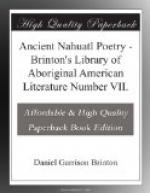3. He who saw the palaces and court of the old King Tezozomoc, how flourishing and powerful was his sway, may see them now dry and withered; it seemed as if they should last forever, but all that the world offers is illusion and deception, as everything must end and die.
4. Sad and strange it is to see and reflect on the prosperity and power of the old and dying King Tezozomoc; watered with ambition and avarice, he grew like a willow tree rising above the grass and flowers of spring, rejoicing for a long time, until at length, withered and decayed, the storm wind of death tore him from his roots, and dashed him in fragments to the ground. The same fate befell the ancient King Colzatzli, so that no memory was left of him, nor of his lineage.
5. In these lamentations and in this sad song, I now call to memory and offer as an example that which takes place in the spring, and the end which overtook King Tezozomoc; and who, seeing this, can refrain from tears and wailing, that these various flowers and rich delights are bouquets that pass from hand to hand and all wither and end even in the present life!
6. Ye sons of kings and mighty lords, ponder well and think upon that which I tell you in these my lamentations, of what takes place in spring and of the end which overtook King Tezozomoc; and who, seeing this, can refrain from tears and wailing that these various flowers and rich delights are bouquets that pass from hand to hand and all wither and end even in the present life!
7. Let the birds now enjoy, with melodious voices, the abundance of the house of the flowery spring, and the butterflies sip the nectar of its flowers.
* * * * *
The second song is preserved in a Spanish metrical translation only, but which from internal evidence I should judge to be quite literal. The words of the poem do not represent it as a composition by the royal poet, but one which was sung before him, and addressed to him. It admonishes him to rejoice in the present moment, as the uncertainties of life and fate must at some time, perhaps very soon, deprive him of their enjoyment.
II.
1. I wish to sing for a moment, since time and occasion are propitious; I hope to be permitted, as my intention merits it, and I begin my song, though it were better called a lamentation.
2. And thou, beloved companion, enjoy the beauty of these flowers, rejoice with me, cast out fears, for if pleasure ends with life, so also does pain.
3. I, singing, will touch the sonorous instrument, and thou, rejoicing in the flowers, dance and give pleasure to God the powerful. Let us be happy in the present, for life is transitory.
4. Thou hast placed thy noble court in Acolhuacan, thine are its lintels, thou hast decked them, and one may well believe that with such grandeur thy state shall increase and grow.




